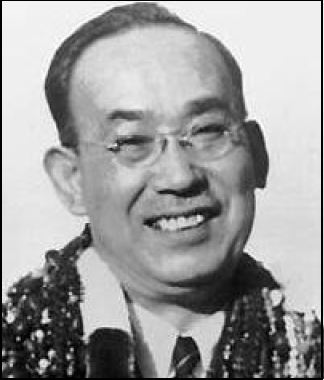


Dr. Chujiro Hayashi
was 47 yearsold, a retired Captain in the Japanese
Navy, when he started his
Reiki training with Mikao Usui in
1925. He and fellow Naval officers
Ushida
and Taketomi are saidto have been Usui.s final students.
It.s believed that Usui met them
while giving healings at a Naval
base, and that Hayashi convinced
him to accept the 3 officers as
Reiki students. They were certainly
not characteristic of his other
students, and some of Usui.s
friends are even said to have been
upset that he would teach his
spiritual method to military men.
In Hayashi.s case at least, it seems the teachings were not very
spiritually oriented. Hayashi was a medical doctor and a Christian,
and his interest was in using Reiki to heal diseases. Also,
Usui.s death in March of 1926 cut short Hayashi.s training; he
had not by then reached the point of learning to give empowerments,
and apparently was taught some form of Reiju after the formation
of the Usui Gakkai, probably by Usui.s student
Toshihiro Eguchi.Dr. Hayashi was involved in the beginning of the Gakkai, but left
it early on, definitely by 1931 if not before.
Following Usui.s death in 1926, Hayashi took charge of Usui.s
.learning place. and moved it to a different area of Tokyo
(Shinano Machi). With the help of Taketomi and Ushida, he taught
original Usui methods there and operated a hospice. In 1931 he
changed the name to Hayashi Reiki Kenkyu-kai (.Hayashi Reiki
Research Center.) and began teaching in his own way (which
caused his student Tatsumi and others to separate from him).
In 1935
Hawayo Takata came to his clinic to be healed, thenbecame his student. She returned home to Hawai.i, where Dr.
Hayashi certified her in 1938 as a .Master of Dr. Usui.s Reiki
system of healing.. Their relationship and their personal philosophies
would define Reiki outside Japan for the remainder of
the 20th century.
On May 10, 1940, in front of his family and a group of his Reiki
students at his home, Dr. Hayashi took his own life by
seppuku(ritual slitting of the
hara) . saying he was a peaceful man andcould not go to war (he knew World War II was about to begin, and
that he would be ordered to serve in it).